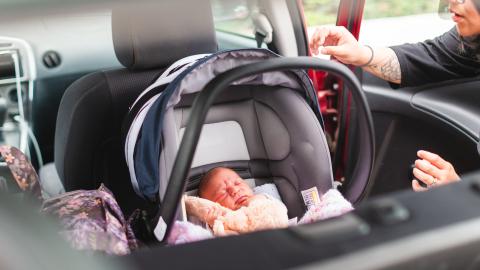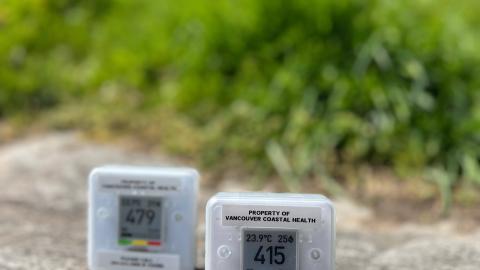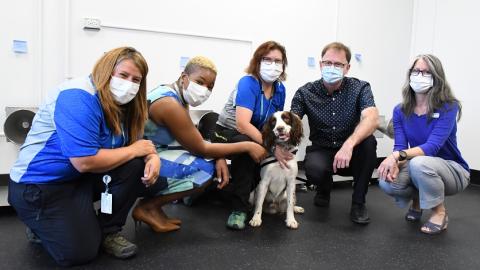Child care
Whether you need full-time or part-time child care for your child, most parents will need child care at some point. If your child is just starting child care, learn how to help the transition and adjustment to help keep your child healthy.
Transitioning to child care
Adjusting to a new child care situation can be difficult, but there are some things you can do to make the adjustment easier.
- Learn about separation anxiety if you think it might be an issue
- Choosing child care: Helping your child get started - HealthLink BC
Tips to help transition to child care
- Give yourself extra time to stay with your child and caregiver on the first day. You may want to consider phasing in child care over time so your child can gradually adjust to the situation if you have the option of doing that.
- Let your child bring a comfort item with them. A favourite blanket or stuffed animal can help reduce anxiety.
- Take time to say "good-bye" to your child before you leave and let them know when you will be back. Just being reassured that you will return can make a big difference.
- Practice getting ready and going to the daycare or babysitter's house before actually starting to go can be a fun way to establish a routine and develop a positive association with the new situation.
- Talk about child care before it begins. Use the caregivers' names often and let your child know what to expect.
Separation anxiety
Some babies have no problems staying with a babysitter or going to daycare. They happily wave to their parents and are soon playing and content. Other babies have a much harder time. Separation anxiety is a common challenge. When your baby seems inconsolably sad or angry as you are leaving them, it can be very distressing for both of you. However, it's important for your baby's development to learn to be without you.
Learn about separation anxiety
Tips to make separation easier
- Play games to show that things that go away come back again, like peek-a-boo.
- Read stories where a child or animal is away from their parents and has a good experience.
- Visit a new daycare or babysitter for a fun visit before your child has their first stay there.
- Don't add new things to your routine, such as a new playgroup, until your baby has adjusted to their childcare routine.
- When leaving your baby, act calm and relaxed.
- Always take time to say "good-bye"; sneaking away while your baby isn't looking will almost always make the situation worse next time.
- Give yourself lots of time with the new caregiver to transition before you have to leave.
Preventing illness in child care
With so many children together at a child care centre, it's easy to pass germs back and forth. The good news is your child is building immunity.
- How to keep your child healthy in child care centres
- Sneezes and Diseases resource guide - Learn how to prevent and treat a variety of common illnesses and information about what to do if your baby gets sick
Tips to help your child stay healthy
- Teach your child to wash their hands regularly, and always before and after eating. Handwashing is the best way to stop germs from spreading. Practice washing hands with your child to make it a fun part of their routine. They should be washing their hands for at least 10 seconds with warm and soapy water.
- Keep your child's immunizations up to date according to the BC immunization schedule.
- Help keep your child healthy by giving them nutritious food to eat, plenty of water to drink, encouraging physical activity and setting them up to sleep as well as possible
- Remind your child to cover their mouths and noses when they cough or sneeze and then wash their hands.
Finding child care
Whether you need full-time or part-time child care for your child, most parents will need child care at some point. If you need child care, start your search early so that you can find a good fit. There are many options for child care. The first thing to do is consider what is important to you.
Types of child care
Learn about choosing child care on HealthLink BC website. There are two kinds of child care:
- Individual providers: You can hire a nanny or babysitter to look after only your baby (and siblings), or
- Group providers: You can find a group child care setting. Group providers looking after three or more children they are not related to need a license to operate. Licensed child care centres undergo regular inspections and have reports that can be viewed online.
Child care
- Search for child care in BC - BC Gov
- Child Care Resource & Referral (CCRR) centres - BC Gov
Considerations for child care
Start your search for a child-care provider early so you can find a good fit for your family. Remember this is a big change, so be patient with your child and yourself as you adjust to new routines. There are many options available but the first thing to consider is what is important to you.
- Do you need full-time, part-time or occasional child care? If it isn't full-time, will the days and hours change each week?
- What hours do you need your child to be in care? (Don't forget to include your travel time to and from if it isn't in your home.)
- How much can you afford to spend on child care each month?
- What type of environment will best suit your child? Do you want them to have individual attention or be in a group to develop social skills? Do you want your child cared for in your home or somewhere else?
Learn more: Choosing and Adjusting to Childcare for Toddlers and Choosing Child Care on HealthLink BC.
Costs
Costs can vary greatly depending on the type of care you find for your child.
- If the cost of child care is too high for your budget, you may be eligible for the BC Child Care Subsidy.
- If your child has special needs, you may also be eligible for the Special Needs Supplement. This ensures extra resources are available to support your child.









































